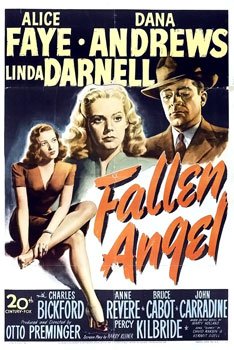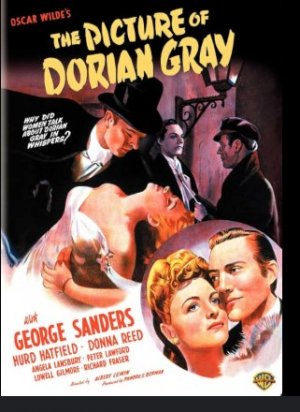 Fallen Angel
Fallen Angel (1945)
Otto Peminger directed this classic noir tale of seduction, double dealing, and murder. The impressive cast includes
Dana Andrews, Alice Faye, and
Linda Darnell, along with well cast character roles for
Charles Bickford, John Carradine, and
Percy Kilbride. The excellent score was by
David Raksin, and photography by
Joseph LaShelle.
The story opens with a now familiar noir trope of a drifter (Andrews) landing in a small country town where he winds up in a small diner. Bu the diner’s sultry waitress (Darnell) has not shown up for work in a few days, and the cafe’s love sick owner is worried that she won’t come back. When she does return, the drifter falls for her. But the waitress is a bit of a siren, and taunts the drifter that he hasn’t the wherewithal to marry her and provide her a home.
The drifter hatches a plan to marry a wealthy single town’s girl (Faye), then use the money he gets from her to dump her and run away with the waitress. This all sets up a few story twists, followed by a gratifying ending.
This is a second watch for me, and although
Fallen Angel is enjoyable prime classic noir, the important relationship between the drifter and the wealthy town girl never felt well developed-- like it was sprung into the story. How and why did she fall in love with this no account guy? And how did it happen so fast?
After some research it turns out that Alice Faye had accepted the role on the conditions that she star with Andrews, 20and that she would chose and sing the film’s theme song. Turns out that studio head Darryl Zanuck was grooming
Linda Darnell to be a big star, so he cut many of Faye’s scenes in order to feature Darnell. In addition Faye’s singing that was supposed to be the theme song --”Slowly”-- was cut, and put later in the film playing on the juke box! But the absence of some key scenes with Faye and Andrews was what made their relationship be so incongruous.
The film music was beautifully composed by David Raksin, who had the year before written the song “Laura”, the popular theme song for the movie of the same name the year before. On a personal note, when I returned to the music business in 1978, I stayed for several weeks at a previous band member’s home in Studio City, near Hollywood. I was astonished to learn that the house had been built and previously occupied by David Raksin, and the studio where I stayed on the property was the same studio where he composed much of his music, including “Laura”. I was proud to have had a coincidental brush with the great songwriter!
Available on YouTube.
Doc’s rating: 6/10


